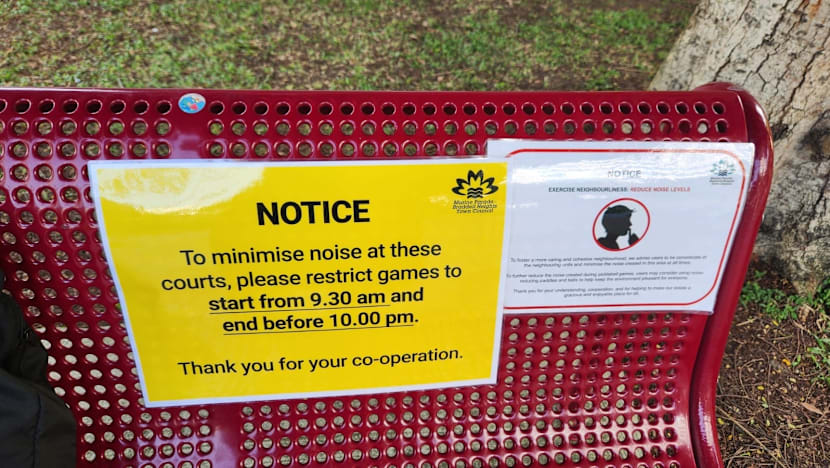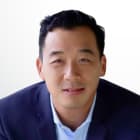Commentary: Are pickleball noise complaints a sign of a less tolerant Singapore?
From the dwindling number of golf courses to noise complaints about pickleball, recreational sports has been crowded out by competing demands, says former national athlete Nicholas Fang.

Signs put up by a town council to restrict pickleball games. (Photo: Mr Lau)

This audio is generated by an AI tool.
SINGAPORE: It is fair to say that Singapore’s relationship with sports is not as deeply rooted as it is in other countries, such as those in the West.
As a small nation with many competing social demands including the pursuit of educational qualifications, building of careers and national service requirements, it is not hard to see why sports have not been a top national priority over the years.
In recent months, the competition for space between sporting activities and other aspects of life has made headlines. In July, the government announced that it would not renew the leases of six golf courses, citing the need for the land for other uses.
More recently, pickleball – a paddle sport that blends tennis, badminton and table tennis – has been in the news not just for its rising popularity, but also for growing noise complaints in residential areas.
Over 700 complaints about noise generated from people playing the sport in Housing and Development Board (HDB) estates were received between January 2024 and August this year. Tensions have risen between residents and players over the sharp sounds produced when the plastic balls strike the hard paddles and ricochet off the floor.
This has led to organisations cutting back on the sport, even as demand continues to rise. A few town councils have put up signs informing players to avoid games early in the morning or late at night and have begun locking up community courts after hours.
FAMILIAR TENSIONS
These tensions are not new. For example, since the early 2000s, town councils have periodically put up barriers to stop children from playing football in HDB void decks, over concerns of stray balls causing injury and the dirtying of walls.
Observers have bemoaned the loss of options for youth to play sports at a time when parents are grappling with the impact of technology on their social lives and mental health.
This argument might now be extended to more demographics in society. Pickleball has historically been popular among older players due to its low-impact nature, but it is now catching on with young adults because it is relatively easy to learn.
As for golf, the number of on-course golfers has almost doubled from 80,000 in 2018 to 140,000 in 2024. The Singapore Golf Association has also pointed to an increase in the number of young players taking up the sport.
Much has been said about Singapore’s search for a true sporting culture. These latest developments do not seem to bode well for the long-term development of a society where sports and fitness activities are embraced by all.
QUESTION OF TRADE-OFFS
As with most things in land-scarce and population-dense Singapore, sports is subject to trade-offs between competing demands.
For example, when the leases of golf courses expire, the land can and will be used for other purposes such as housing and industrial facilities.
Currently, just 1.9 per cent of Singapore’s land area is occupied by golf courses. But even as a flailing but enthusiastic golfer, I can see why the relatively large swathes of land needed to lay out a full 18-hole course can be put to more productive use in our small country.
And if the “pok pok” sounds of a hotly contested pickleball match keep families up on a weekday night with school and work looming in the morning, I can empathise as well.
But my own fears are twofold. First, that these are signs of an increasingly intolerant society. The recent case of a man allegedly killing his neighbour in Yishun due to a noise dispute is a stark reminder of what could happen when emotions boil over such tensions. My sincere hope is that we do not see more of such incidents, whether they stem from pickleball or otherwise.
The second concern stems from what this means for Singapore’s potential to become a true sporting nation.
WHITHER A TRUE SPORTING SINGAPORE?
While the issue of trade-offs is a real challenge that policymakers have to grapple with, it is worth knowing and understanding that it works the other way as well.
If we as a country prioritise alternative land uses or our own convenience and comfort, sports may fall even lower in our list of national priorities.
Having less access to facilities and opportunities for recreational sports tips more Singaporeans into a sedentary lifestyle. A less active population today risks becoming a less healthy one tomorrow, adding pressure to the healthcare system as Singapore enters its super-aged phase, where more than 21 per cent of the population is aged 65 or older.
I can’t say for sure what the optimal solution would be in the specific cases of golf courses and the rising number of pickleball aficionados in Singapore, but I do hope that we as a society are cognisant of what it means to err on the side of reducing sporting activities in response to competing demands or negative public sentiment.
Sport has much to offer to a country and society, in terms of health benefits and national pride. If investing in sports requires us to sacrifice something in return, perhaps it is something we as a nation should consider.
Nicholas Fang is a former national fencer, triathlete and sports administrator, and was Team Singapore’s chef de mission at the 2015 Southeast Asian Games. He is a former Nominated Member of Parliament and currently runs local sports consultancy Novastella. He writes a monthly column for CNA, published every second Wednesday.


















